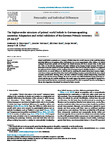The higher-order structure of primal world beliefs in German-speaking countries: Adaptation and initial validation of the German Primals Inventory (PI-66-G)
| dc.contributor.author | Stahlmann, AG | |
| dc.contributor.author | Hofmann, J | |
| dc.contributor.author | Ruch, W | |
| dc.contributor.author | Heintz, Sonja | |
| dc.contributor.author | Clifton, JDW | |
| dc.date.accessioned | 2020-04-28T09:48:27Z | |
| dc.date.issued | 2020-09-01 | |
| dc.identifier.issn | 0191-8869 | |
| dc.identifier.other | 110054 | |
| dc.identifier.uri | http://hdl.handle.net/10026.1/15604 | |
| dc.description.abstract |
Primal world beliefs–or primals–are a category of beliefs about the overall character of the world that inform individual differences in cognition, affect, and behavior. In a recent comprehensive effort, Clifton et al. (2019) cataloged 26 pervasive primals and developed the Primals Inventory (PI-99) to measure them. In this study (N=592), we describe the adaptation and initial validation of the German Primals Inventory (PI-66-G), an instrument to measure primals in German-speaking countries. The PI-66-G's first-order structure was supported by exploratory factor analyses and the resulting scales demonstrated good reliability (median α=0.81). Based on the PI-66-G, we extend Clifton et al.' (2019) work by modeling the primals' hierarchical structure: Higherorder factor analyses reproduced their three-level model including one primary primal (Good), the three original secondary primals (Safe, Enticing, Alive), and three additional secondary primals (Empowering, Communal, Fluid). In line with the previous findings, the PI-66-G's primals were differentially (but mainly positively) correlated with the Big Five and life satisfaction. The results suggest that primals can generally be organized in a hierarchical model, but that the current model cannot properly describe every primal. Based on our findings, we discuss three hypotheses that should be evaluated in future research. | |
| dc.format.extent | 110054-110054 | |
| dc.language | en | |
| dc.language.iso | en | |
| dc.publisher | Elsevier BV | |
| dc.subject | Primal world beliefs | |
| dc.subject | Primals | |
| dc.subject | Adaptation | |
| dc.subject | Higher-order analysis | |
| dc.subject | Life satisfaction | |
| dc.subject | Big Five | |
| dc.title | The higher-order structure of primal world beliefs in German-speaking countries: Adaptation and initial validation of the German Primals Inventory (PI-66-G) | |
| dc.type | journal-article | |
| dc.type | Journal Article | |
| plymouth.author-url | https://www.webofscience.com/api/gateway?GWVersion=2&SrcApp=PARTNER_APP&SrcAuth=LinksAMR&KeyUT=WOS:000537549100037&DestLinkType=FullRecord&DestApp=ALL_WOS&UsrCustomerID=11bb513d99f797142bcfeffcc58ea008 | |
| plymouth.volume | 163 | |
| plymouth.publication-status | Published | |
| plymouth.journal | Personality and Individual Differences | |
| dc.identifier.doi | 10.1016/j.paid.2020.110054 | |
| plymouth.organisational-group | /Plymouth | |
| plymouth.organisational-group | /Plymouth/Faculty of Health | |
| plymouth.organisational-group | /Plymouth/Faculty of Health/School of Psychology | |
| plymouth.organisational-group | /Plymouth/REF 2021 Researchers by UoA | |
| plymouth.organisational-group | /Plymouth/REF 2021 Researchers by UoA/UoA04 Psychology, Psychiatry and Neuroscience | |
| plymouth.organisational-group | /Plymouth/REF 2021 Researchers by UoA/UoA04 Psychology, Psychiatry and Neuroscience/UoA04 Psychology, Psychiatry and Neuroscience MANUAL | |
| plymouth.organisational-group | /Plymouth/Research Groups | |
| plymouth.organisational-group | /Plymouth/Research Groups/Plymouth Institute of Health and Care Research (PIHR) | |
| plymouth.organisational-group | /Plymouth/Users by role | |
| plymouth.organisational-group | /Plymouth/Users by role/Academics | |
| dcterms.dateAccepted | 2020-04-11 | |
| dc.rights.embargodate | 2020-4-29 | |
| dc.rights.embargoperiod | Not known | |
| rioxxterms.versionofrecord | 10.1016/j.paid.2020.110054 | |
| rioxxterms.licenseref.uri | http://www.rioxx.net/licenses/all-rights-reserved | |
| rioxxterms.licenseref.startdate | 2020-09-01 | |
| rioxxterms.type | Journal Article/Review |


